[ad_1]
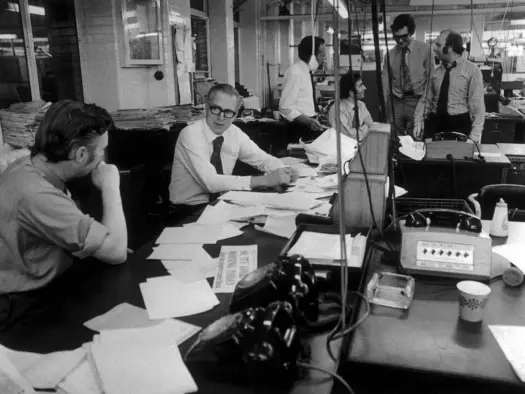
This is an updated piece written by Stuart Kuttner, former Evening Standard reporter from 1963 and news editor between 1971 and 1977, for a staff reunion in June 2017.
It recalls an era of the London newspaper in which its paid circulation ranged from 600,000 to 800,000 daily.
The Evening Standard of our day was a superb newspaper with an immutable credo: to break the news and set the agenda.
The newsdesk – the vibrant engine room of the newspaper – was proud and demanding, and celebrated in Fleet Street.
Whether it was the appalling 1975 Moorgate tube train crash – with 42 fatalities – or the dramatic capture of Harry Roberts on the run after the remorseless slaughter of three police officers in 1966, the Standard was first with the news and first with the detail. The Lord Lucan murder case, late on a November night in 1974, was a classic example.
The competition was every other newspaper plus radio and TV. When a major story appeared in the following day’s papers I wanted to know why we had not had a whiff the day before – regardless of when it had broken!
[Read more: Evening Standard set to go from daily to weekly print edition]
Neither an editor nor a news editor could have asked for a more passionate and diligent team of reporters. Trained and overawed by the headmasterly, suave Edwardian figure of Ronald Harry Picton Hyde OBE, who I had the good fortune to succeed, every member of the team was a salivating bloodhound; not least, but not only, double-channel swimmer Kevin Murphy, Stephen Clackson and Keith Dovkants.
In the Standard’s firmament there were too many stars to count. But here are a few more:
The incisive cartoonist JAK; Milton Shulman, theatre critic for 38 years who knew more about the stage than many actors; boxing’s supreme reporter George Whiting; master of politics Robert Carvel.
Plus film critic Alex Walker, as famous as any actor; cricket’s John Clarke. Not to overlook star writers Anne Sharpley, Mary Kenny and Valerie Grove. Plus Sir Winston Churchill’s granddaughter Emma Soames and Liz (later Dame) Forgan.
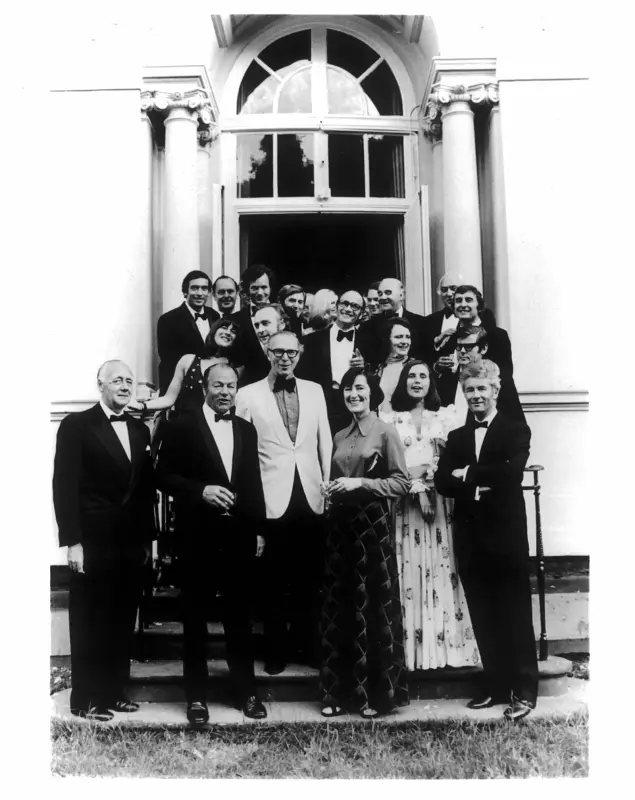
Next row: Valerie Grove, Roy Wright, JAK, Mary Kenny, David Henshall
Next: Stuart Kuttner, Tom Pocock, Simon Jenkins, Jeremy Deedes, Robert Carvel, Milton Shulman and Angus McGill. Picture: Stuart Kuttner
There was Maureen Cleave too, author of the Beatle John Lennon interview in 1966 that produced furore with Lennon’s unforgettable quote: “We are more popular than Jesus.” Plus author Eric Linklater’s son, the stylish Magnus.
Meanwhile, the incomparable columnist Sam White lit up all Paris society. And Max (now Sir) Hastings covered more wars than many Generals. Bill Davis was our go-to City expert and Fay Maschler dished up the spiciest of food columns.
Reigning over all was editor Charles Wintour (father of Anna) with his regular notice board bulletins, always perceptive, though occasionally woundingly acerbic. A seemingly remote intellectual and sometimes harsh figure of whom Bernard Levin noted: “Beneath that chilly exterior lies a heart of ice.” Though if you mined deep enough there lurked a sensitive figure.
We wanted – and I believe often did – to turn out one of the finest newspapers in the world. News, Features, Jeremy Deedes’ Londoner’s Diary and Sport – edition by edition our appetite was rarely satisfied.
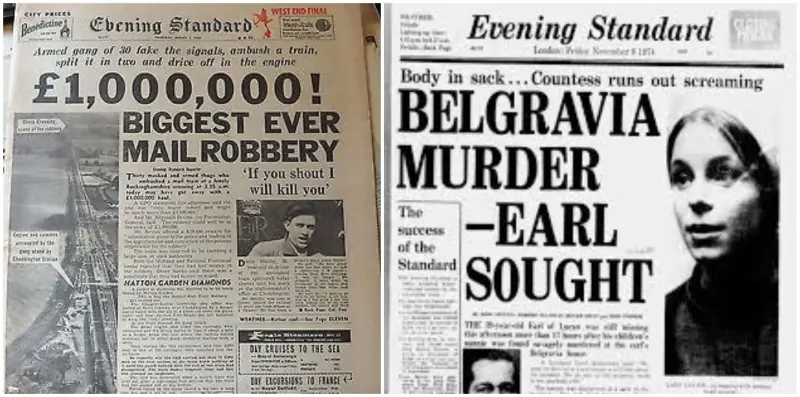
Dedication and professionalism lay at the heart. One night, after the floor at No. 47 Shoe Lane, had cleared and the day had ended, a newsdesk phone rang.
Momentarily, the last person left was tempted to walk away. Instead, he answered it – and the caller told him about a labrador called Paddy that had helped in the rescue of a man floundering out of his depth in the chilly Atlantic currents off the Scilly Isles. So what? Except that the figure whose life had been saved was the Prime Minister, Harold Wilson. One phone call, one world scoop. All thanks to a weary but dedicated staff member.
I remember too how a curmudgeonly Jack Miller would quietly leave the office murmuring he was just “off to see a contact”. Unlike some in the Street of Adventure, Jack was not headed for the office pub, the Two Brewers. Ninety minutes or so later he would file the arrest of the notorious Russian spy John Vassall. Or news of the multi-million-pound raid on the exquisite Dulwich Art Gallery. That was our journalism.
An incredible long shot - a phone call to Aristotle Onassis at Claridge’s – produced a world-beating intimate interview with the Croesus-rich Greek shipping magnate on the state of his marriage to the widowed Jackie Kennedy.
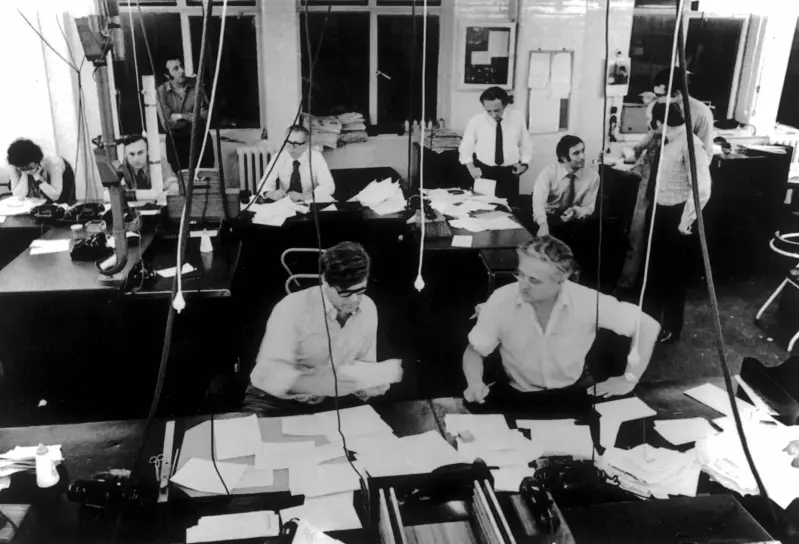
And despite a milieu of internecine departmental rivalry, a 1973 tip-off from Suzy Menkes resulted in a wonderful, final edition exclusive, one of the newsdesk’s greatest coups.
At No.10 Downing Street – where else – fashion editor Suzy heard that an important announcement was imminent, but no more than that. Calls from the newsdesk to police, politicians and elsewhere failed to produce a hint.
Finally – armed with no information at all, we put in a call to Buckingham Palace. On a hunch the caller asked the Queen’s Press Secretary Ronnie Allison whether anything was brewing, say an announcement that, despite months of denials, Princess Anne was to marry Captain Mark Phillips. “Pure speculation,” responded Allison.
The journalist persisted. “If we ran a story on the front page of the final edition today to say that the Princess and Mark were to wed would I be looking for a new job on Monday?” he asked.
“I shouldn’t think so,” Allison drawled. Another classic scoop for our cherished Standard.
Nothing beat the sheer exhilaration of being first and best in Fleet Street’s 24-hour unique drama.
It was a privilege to be part of that breathless, elitist, golden time.
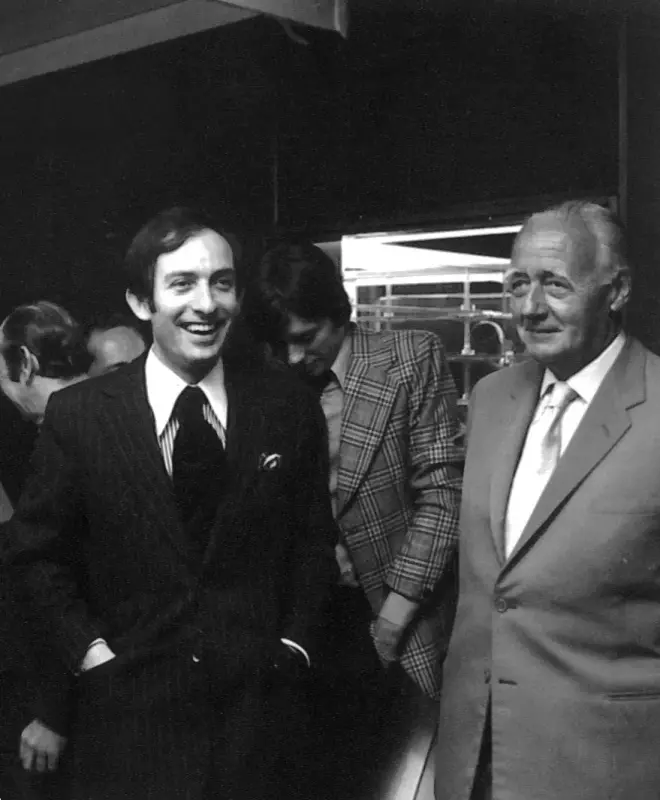
The post Memories of the 1970s Evening Standard: ‘Breathless, elitist, golden’ appeared first on Press Gazette.
[ad_2]
Source link


